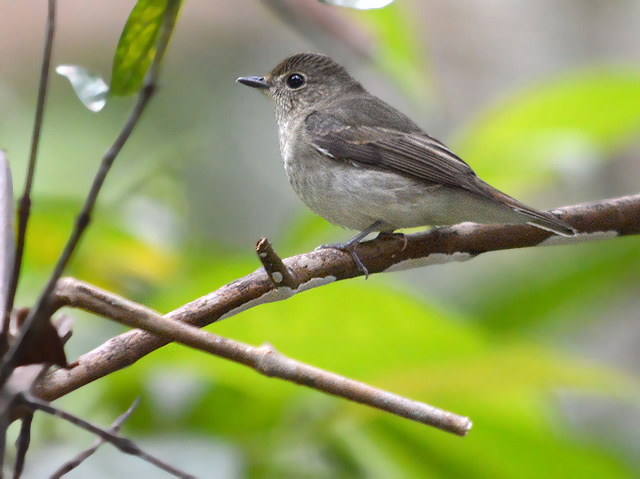A
few weeks ago, my life list was revived from dormancy with the addition of the
Dusky Craig-Martin which I finally unblocked in Perlis. Today, I set off to the
foothills of Bukit Larut in Perak state to twitch for Peninsular Malaysia’s
first Narcissus Flycatcher. And who else better to go with than the birder who
discovered this vagrant in the first place – James Neoh. After an early
breakfast in the rustic town of Taiping, we made our way to the entrance of a
water treatment plant where my would-be lifer has been regularly seen of late.
I was a little relief we were the first to arrive. Word have also gotten out of
a Green-backed Flycatcher, another scarce migrant, is showing well in the
vicinity and a crowd was expected. Anyway, the striking male Green-backed
Flycatcher was the first to reveal himself and he was the perfect appetizer for
the main course that is to come – hopefully. The lighting conditions were
challenging today but the radiant colouration of this flycatcher will not be
subdued.
Anxiety
started building up in me as there was no sign of the Narcissus Flycatcher. The
presence of several species of Bulbuls and even a flock of Scarlet Minivets did
very little to improve the situation. The Narcissus Flycatcher was a female
bird and a pale comparison to the glorious plumage of the male birds but she is
a first record for the peninsular. Like most divas, she opted for the
fashionably late entrance. Well, better than never. I was enjoying my second
lifer for this month and life, could not get any better.
Eventually,
a crowd did form along the access road to the water treatment plant. Everyone
managed to get both celebrity birds. Unfortunately, the male Green-backed
Flycatcher was no gentlemen and will drive away the female Narcissus Flycatcher
whenever their paths crossed. The chances of better photographic opportunities of
the latter were now near impossible and we decided it was time to take our
leave. Here are a few more images of the bully. Despite some resentment, I
still gave him the attention and appreciation he deserves.
With
my main target in the bag, I could afford to relax and even took the time to enjoy
the view of the ever picturesque Taiping Lake Gardens.
On
one of the many majestic Rain Trees that line the access roads, we found a
juvenile Long-tailed Parakeet peering inquisitively out of its nest hole. This
striking native species is sadly missing from my home state of Penang and the
lake gardens is probably the closest place to home where it can be easily seen.
A
lone Black-thighed Falconet alighted on the same tree and provided the last
bird for our visit to this locality.
We
visited the Kuala Gula Bird Sanctuary next. Or should it now be known as the
Kuala Gula Aquaculture Park. This once birding hotspot is slowly being killed
off by commercial ponds. The damages to the environment is devastating. Another
birding location bites the dust in the hands of Man. A detour to an adjacent
temple certainly lifted my spirit. This, however, is no ordinary temple and I
needed some spiritual healing of the birding kind after the disheartening visit
to the mangroves. It is home to a pair of Sunda Scops-Owl and this famed temple
owls gave me the slip during my first visit here years ago. Luck was on our
side this time and we managed to locate one of the owls roosting in a clump of
bamboo. The Sunda Scops-Owl is not uncommon but any diurnal encounters with
owls is special and usually memorable. This encounter is no exception and this
adorable owl almost overshadowed the exhilarating time I had with my lifer
earlier on.
While
scrutinizing my images of the owl later, I noticed it had very pale corneas
which is not a known field mark of the Sunda Scops-Owl. At the time of writing,
I am still assisting Dave on determining this eye colour variation of the owl
and if significant enough, submit an article to the region’s bird authority.
Our
last destination of the day was the swamp forest of Air Hitam Dalam where
another rare migratory flycatcher has taken up refuge. Last week, we discovered
a Taiga Flycatcher at this site. It has been seven long years since the
individual that wintered at the car park area of Bukit Wang. Naturally, I
wanted to obtain better shots than last week’s brief encounter. The lighting
was much better this time and I got what I wanted. However, there is still room
for improvement and I will certainly be back for more. Three rare flycatchers
all on the same day is like a birder’s dream coming true and this migratory
season looks set to be one heck of a ride.

















No comments:
Post a Comment